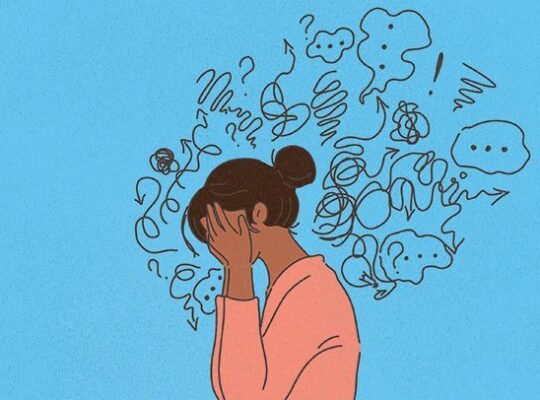“If her husband tortures her so much – why doesn’t she leave??!!!”
“If the boss is so abusive – why doesn’t he stand up for himself??!!!”
“If they have a problem – why don’t they just talk!!!”
“If she doesn’t agree – why doesn’t she just tell her parents!!???”
“If he knows he is going to die – why doesn’t he stop drinking!!???”
We often assume that good decision making is based on knowing what is the ‘good’ thing to do, the ‘logical’ thing to do. So we are often confused when people behave illogically. When they keep doing what is clearly counter-productive.
Truth is, our decision making is not based on morality or logic – but simply on choosing the LESS PAINFUL option out of the options we can SEE.
Decision making is not based on morality or logic – but simply on choosing the LESS PAINFUL option out of the options we can SEE.
So there are two parameters:
a) What options we can see
b) Which option we perceive as less painful
For example, say I am caught for not wearing a helmet.
I see 3 options:
a) Offer a bribe. Be perceived as corrupt.
b) Pay the fine. Lose money.
c) Plead to let me go. Lose some self-respect.
I want to maintain an image of not being a corrupt citizen. Being perceived as corrupt is painful. Paying fine is painful too.
I suddenly learn that fine amount is just Rs. 100. I might pay it without a fight, proudly ask for a receipt and feel good about not pleading or offering a bribe. My story is “I am an upstanding citizen” Many might not care. Their belief is “This is how India works”
But let’s say I get caught for a traffic offense that has a fine of Rs. 5000. Sudeenly option b seems very painful. So I struggle with option a and c. I try c, and maybe finally given in to option a. But my STORY now changes. Maybe it is “The system is so broken. What can an honest citizen do!!” So my story that “I am not corrupt” is still safe. “I did not want to…I had to!!”
The story can be random – but the decision making pattern is the same.
People who have a positive story about me might wonder “Vijay always speaks about not offering a bribe etc We have seen him being honest in so many situations…How could he offer a bribe!!! There must be some reason!!!”
People who have a negative story might feel vindicated. “We always knew he was a hypocrite. It is proved at last!!”
As you can see, each party ends up proving their story. Either by interpreting evidence to prove their story or collecting evidence until their story is proven.
Notice another interesting thing: My need to defend my story(“I am not corrupt”) is much higher when I actually offered a bribe, than when I did not!! I now become over-sensitive to any accusations of corruption.
Whatever offends us too much, is an invitation to look within.
______
Lets take a harder case of the woman who won’t leave her physically abusive husband.
You wonder why she chooses to suffer. Maybe she just wants to!!
What options does she see?
a) Stay in the marriage. Suffer pain.
b) Leave the marriage. Suffer social stigma. Abandon kids. She starves.
Guess which option she chooses?
If you have been educated and supported enough, you see the option c)
c) Leave. Find a source of income. Earn enough to live independently.
But she doesn’t see that option. Or perceives it as too hard. Delusional. Impractical. Might as well try to ‘fight it out in court’!! (Option d. Which we all might perceive as impossible)
How would she choose an option she cannot see? Or perceives as impossible?
But while she chooses option a, she has to “make peace” with it. Else the suffering is intolerable(“I have voluntarily chosen to suffer eternal pain”!!). So she, others come up with story of ‘For Indians, divorce is never an option’, ‘Kids should not lose father’, ‘Commitment is everything’ etc This eases the pain. But you can guess the side effects of believing and sticking to this story….
If we really want to help her, the solution then is to a) make her aware of option c b) Make her aware of ways to reduce the perceived pain. Or provide support to reduce pain.
Instead what she gets is stories like “How can you not care about your children!!!”, “People like you don’t leave and encourage abuse!!”, “You are Durga devi!! Leave!!”, “You have to stand up for yourself!! Don’t be a coward!!!”, “This is how patriarchy dominates. Men are evil. Don’t you see???!! We worship women on on hand, and abuse them on the other. We are with you!!!”
The last one is tricky. Cos the intention is noble. But it only explains the pain, places the blame. Doesn’t address her pain.
For the woman, how does she “leave 1 bad man, and go out alone in a WORLD of bad men???!!” The good intent backfires. But even that does not change anything, cos often the unconscious objective is ‘Defending ideology’ over ‘Helping humans’
We all have our stories to defend.
So there is a lot of emotions, outrage around the stories – but nothing really changes in reality.
Coming back to the woman, if option (a) is what she is going for, then all these ‘accusations’ alienate her further. She digs her foot deeper into her story of “I am being a good Indian”, or “Ideal wife”…and “You will never be able to understand!!” Any story that helps rationalize her decision works. The truth really does not matter.
Any story that helps rationalize her decision works. The truth really does not matter.
That’s why moral, logical lectures never work. 🙂 We differ not in how good or bad we are, but in how we see. Adopting the moral, logical approach threatens people’s stories about themselves, but does nothing to change their decision.
So when you find someone suffering and want to help, but find them doing unhelpful things, and closed to your advice, what can you do to help? We will explore that in the next post.



